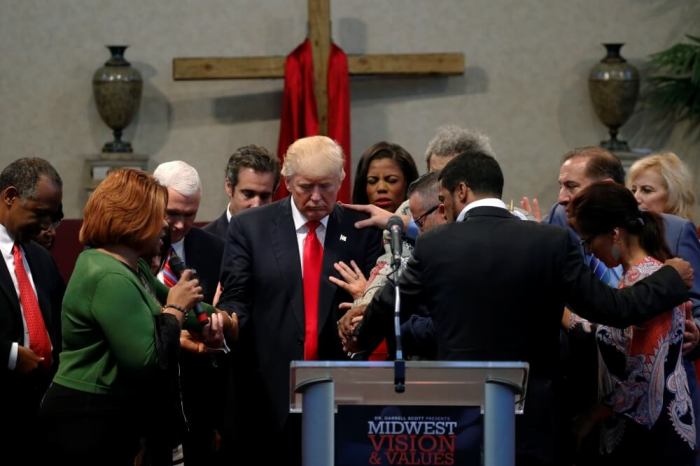Fast-Growing Christian Movement Attracts the Young, Upends Religious, Political Landscape

An entrepreneurial Christian movement described as "Independent Network Charismatic" or INC is now the fastest growing Christian group in America, two researchers say, and it is attracting the young and wielding powerful influence on both the religious and political fronts.
In their recently released book, The Rise of Network Christianity, academics Brad Christerson, professor of Sociology at Biola University, and Richard Flory, senior director of research and evaluation at University of Southern California, discuss the movement closely connected to "conservative U.S. politicians, including Sarah Palin, Newt Gingrich, Bobby Jindal, Rick Perry and more recently President Donald Trump."
"Based on our research, we believe that INC Christianity is significantly changing the religious landscape in America – and its politics," Christerson and Flory explained in The Conversation last Wednesday, in a sort of primer on the movement.
"INC Christianity is the fastest-growing Christian group in America and possibly around the world. Over the 40 years from 1970 to 2010, the number of regular attenders of Protestant churches as a whole shrunk by an average of .05 percent per year, while independent neo-charismatic congregations (a category in which INC groups reside) grew by an average of 3.24 percent per year," the authors said.
While the group believes as other charismatics do in miracles and the supernatural, INCs are much more focused on spreading their beliefs through media conferences and ministry tools rather than building congregations. Instead of transforming society through proselytizing, they are also more focused on "transforming society through placing Christian believers in powerful positions in all sectors of society." They are also organized as a network of independent leaders rather than as formally organized denominations.
"Our primary conclusion is that the growth of these groups is largely the result of their network governance structure. When compared to the oversight and accountability of formal congregations and denominations, these structures allow for more experimentation. This includes 'extreme' experiences of the supernatural, unorthodox beliefs and practices, and financing as well as marketing techniques that leverage the power of the internet," the authors wrote.
"In our research, we witnessed the appeal of INC Christianity, particularly among young people. We saw the thrill of holding impromptu supernatural healing sessions in the emergency room of a large public hospital, the intrigue of ministry school class sessions devoted to the techniques of casting out demonic spirits and the adventure of teams of young people going out into public places, seeking direct guidance from God as to whom to heal or to relay specific divine messages."
The researchers explained that most INC Christian groups they studied "seek to bring heaven or God's intended perfect society to Earth by placing 'kingdom-minded people' in powerful positions at the top of all sectors of society."
Leaders of the movement have labeled these sectors the "seven mountains of culture." They are business, government, media, arts and entertainment, education, family and religion.
"They believe if Christians rise to the top of all seven 'mountains,' society will be completely transformed," said Christerson and Flory.
And some of them see the election of Donald Trump as part of fulfilling God's plan to "bring heaven to Earth." That position is further strengthened by placing believers in top posts in government like Rick Perry, who is currently heading the Energy Department; Betsy DeVos directing the Department of Education; and Ben Carson leading the Department of Housing and Urban Development.
While The Rise of Network Christianity authors believe the new movement will "continue to draw adherents in large numbers in the future," they do not predict the group will be successful in taking over the "seven mountains of culture."
"We see the likelihood of INC Christians taking over the 'seven mountains of culture' as slim. However, we also believe that this movement is sure to shake up the religious and political landscape for generations to come," they said.
Dr. Gene Edward Veith, provost and professor of literature emeritus at Patrick Henry College and director of the Cranach Institute at Concordia Theological Seminary in Fort Wayne, Indiana, explained in a blog post that INC "leaders are part of the New Apostolic Reformation movement, which more fully accounts for their theology."
"Lots of Christians supported Donald Trump, for many different reasons.... But some apparently supported him for theological reasons. Did you notice how a number of Pentecostal groups, particularly those influenced by TV preachers, were with Trump from the beginning and expressed no qualms about some of his questionable behavior?" he asked.
"These are not to be confused with Dominionists or Theonomists, who are Calvinists. Nor do they seem to be millennialists, either pre- or post-, though I could be wrong about that...They are charismatics, seeing leadership in all of these areas as a sort of spiritual gift," he said. "They also strike me as applying the 'prosperity gospel'–which these groups also hold to–on the national level."




























